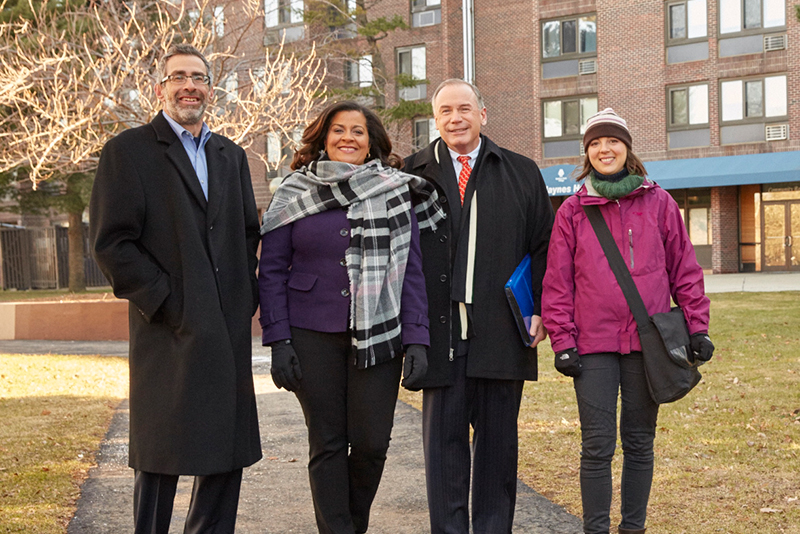Sustainable Urban Living
Professor and alum team up to improve energy efficiency in low-income housing

Robert Kaufmann (from left); Jeanne Pinado, MPDC chief executive officer; Jim Quirk, a representative of Wells Fargo; and Marta Marello. Photo courtesy of BU’s College of Arts & Sciences
Nearly 40 percent of US energy consumption and carbon emissions come from buildings, costing approximately $1 billion per year from utilities in public housing alone. Marta Marello, a 2013 alumna of Boston University’s Graduate School of Arts & Sciences (GRS), and Robert Kaufmann, a GRS professor of earth and environment, are working to reduce those costs with clean technology.
As part of BU’s Sustainable Neighborhood Lab (SNL), Marello and Kaufmann are working with other University professors on their research project, Enhancing Energy Efficiency for Urban Housing. The goal? To identify the factors driving energy use, and, in turn, achieve greater energy efficiency in one of Boston’s own low-income housing communities operated by the Madison Park Development Corporation (MPDC). Nearly 20 percent of MPDC’s operating costs (approximately $5 million) are energy expenses.
In addition to improving energy efficiency through appropriately designed programs, incentives, and technology, the group wants to keep in mind the needs, behavior, and budget of both residents and property managers. To date, the project actively involves over 100 residents while providing summer jobs for five local high school students. Kaufmann hopes to use this insight to find a scalable solution and develop a clean-technology model for other low-income housing communities. “To solve the problems, you have to understand how people live and the challenges they experience,” he says.
Wells Fargo provided a $75,000 clean technology and innovation grant to BU in support of this research.
Also part of the SNL research team are Michael Gevelber, an associate professor of mechanical engineering at BU’s College of Engineering, and Nalin Kulatilaka, the Wing Tat Lee Family Professor in Management and a professor of finance at BU’s Questrom School of Business, as well as Enrique Silva, a senior research associate at the Lincoln Institute of Land Policy.